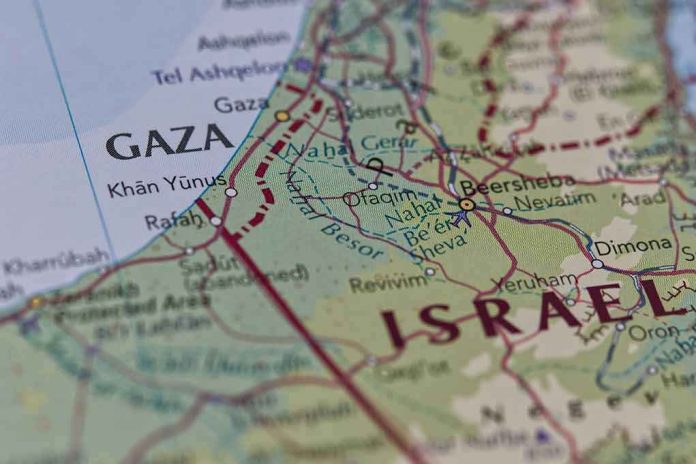
Global powers just authorized a Trump-led international force to disarm Hamas and overhaul Gaza—testing American leadership and constitutional values on the world stage.
Story Snapshot
- The UN Security Council endorsed President Trump’s Gaza peace plan, marking a major shift in international policy.
- The plan demands Hamas’s removal and the creation of a new government in Gaza, directly confronting terrorist rule.
- Resolution 2803 authorizes a temporary international force for Gaza, escalating global involvement.
- China and Russia abstained, highlighting strategic divisions and skepticism toward U.S. leadership.
UN Endorses Trump’s Gaza Peace Plan: A New Era of International Intervention
On November 17, 2025, the United Nations Security Council voted to back President Donald Trump’s peace plan for Gaza. The resolution, passed with 13 votes in favor and two abstentions, calls for the disarmament of Hamas and the establishment of a new, non-terrorist government in Gaza.
This decisive action follows urgent calls for intervention, notably after Waltz described the territory as “hell on earth,” spotlighting the humanitarian crisis and the need for immediate change.
Resolution 2803 represents a significant escalation: for the first time, the Security Council authorized a temporary international force to stabilize Gaza. The plan’s explicit demand to remove Hamas sets it apart from previous failed initiatives.
China and Russia’s abstentions—rather than outright vetoes—reveal strategic hesitation and underline the complex geopolitical landscape. This international endorsement signals both support for U.S. leadership and lingering doubts about implementation and long-term outcomes.
Why Trump’s Plan Matters for American Conservatives
President Trump’s peace initiative aligns with core conservative values: strong national defense, opposition to terrorism, and the assertion of American leadership. By directly confronting Hamas, a group designated as a terrorist organization by the U.S. and EU, the plan seeks to restore order and security in Gaza while defending Western interests.
The resolution’s passage also reflects Trump’s broader legacy of decisive, results-driven diplomacy—contrasting sharply with years of left-wing policies perceived as weak or ineffective on global threats.
Conservatives frustrated by previous administrations’ globalism and appeasement see this intervention as a victory for common sense and constitutional principles. The plan’s demand for disarmament directly confronts threats to regional stability, echoing Trump’s earlier successes against ISIS and other hostile actors.
For readers concerned about government overreach and erosion of American sovereignty, the Security Council’s reliance on U.S. leadership reaffirms the nation’s role as a global force for good—while the abstentions of China and Russia remind us of the need for vigilance against foreign influence.
Implementation Challenges: Disarming Hamas and Securing Gaza’s Future
Despite unanimous support among Western powers, disarming Hamas remains a formidable challenge. The group’s entrenched control over Gaza has repeatedly thwarted peace efforts and undermined humanitarian aid.
Analysts and security experts warn that true change will require sustained international commitment, robust enforcement, and cooperation with regional stakeholders. The authorized international force faces immediate risks of confrontation and must navigate a complex environment marked by distrust and ongoing violence.
For Gaza’s civilian population, the intervention brings both hope and uncertainty. Humanitarian organizations anticipate improved access to aid and infrastructure, yet fear further displacement and instability if clashes erupt.
The plan’s long-term impact hinges on the successful establishment of a new government and the restoration of basic services—a process fraught with political and logistical hurdles. American conservatives will watch closely to ensure that the operation upholds constitutional values and resists mission creep or undue globalist influence.
Geopolitical Ramifications and Conservative Vigilance
The UN Security Council’s endorsement of Trump’s plan sets a precedent for future U.S.-led interventions, reshaping alliances and testing international norms. China and Russia’s abstentions signal skepticism about American motives, raising questions about the durability of global consensus.
For the United States, leading this mission reinforces its diplomatic and military strength, but also demands careful oversight to prevent constitutional overreach and protect American interests abroad.
Conservative readers are right to scrutinize the international force’s mandate, the transparency of operations, and the protection of core values. As the situation evolves, advocates must remain alert to any attempts by global institutions or adversarial powers to undermine U.S. sovereignty, family values, or constitutional rights.
The Gaza intervention, while a victory for American leadership, will require ongoing vigilance to safeguard the principles that matter most to patriots.
Sources:
UN Security Council authorizes temporary international force for Gaza – United Nations


